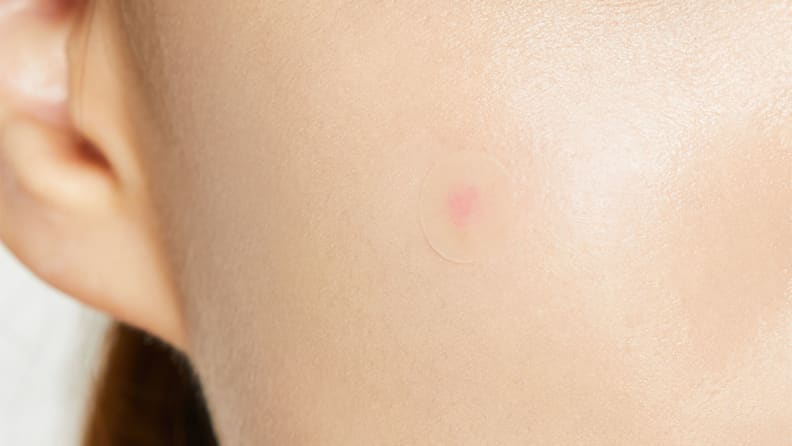How to stop picking at your skin, according to a dermatologist
An expert explains why pimples should have a hands-off rule—once and for all.
Products are chosen independently by our editors. Purchases made through our links may earn us a commission.
When a pimple crests up, it may just seem ripe for popping. After all, squeezing out the stuff that’s clogged in that pore will speed up the healing process, right?
Not so much. As it turns out, pimples are better off left unscratched. We spoke to Dr. Isha Tiernan, a dermatologist at Tufts Medical Center in Boston, to understand why—and how—to leave the skin alone when the urge to pick arises.
Why people pick their skin
There are a number of reasons why someone may pick at their skin. Psychological reasons, such as stress and anxiety can play into the habit—there’s even a diagnosable condition called dermatillomania that’s defined as the obsessive-compulsive desire to pick at the skin. For others, skin picking could simply feel good, bringing a physical sense of relief or pleasure.
Before someone identifies why they pick, they should recognize the habit or compulsion. “It’s important to just acknowledge that you are picking because some people do it subconsciously, so even that is just the first step,” Tiernan says.
Why it’s bad to pick at your skin
In theory, if the person doing the picking only disrupted the very surface of the skin, the epidermis, the damage wouldn’t be too bad. “But oftentimes, when people pick, they tend to be very aggressive about it, so they can actually pick into the deeper layers of the skin, including the dermis,” Tiernan explains. “That can lead to a permanent scar formation [as well as] discoloration of the skin [known as hyperpigmentation] and both of these things can be very unpleasant cosmetically and difficult to treat once they happen.”
Picking can also lead to infections. The same way that scrubbing the skin too hard or over-exfoliating can cause tears in the skin barrier, so can picking. “We all have bacteria that lives on the surface of our skin, but if we’re picking at our skin actively, we create portals or entries for these bacteria to get in and, depending on ongoing history—if they’re immunocompromised, if they’re diabetic—they’re more prone to getting a dangerous skin infection called cellulitis,” Tiernan says. “It’s very important to not pick at your skin.”
How to stop picking the skin

Pimple patches are one way to treat acne and stop picking.
So, yes, picking at the skin is bad news. It’s also a tough habit to break. Tiernan offers a few suggestions to get at the real root of the problem:
- Use alternative methods to clear up pimples: There are myriad acne-treating products on the market, including topical ointments containing benzoyl peroxide and salicylic acid, pimple patches, or even prescription oral medications. Any of these can clear skin faster (and keep it clearer), leaving less temptation to pick.
- Apply a cover-up: Whether it’s the aforementioned pimple patches or a bandage, putting a physical barrier over acne or other typically picked-at spots (like hangnails), can block the fingers from making contact in the first place.
- Hold a warm compress to the skin: For someone that wants the gratification of doing something, try holding a damp, warm cloth to the skin. The heat and moisture can stimulate the pimple to come to a head and heal quicker without causing undue damage.
- Address itchiness: Itchy skin can be an indication of dryness. To avoid or relieve this, moisturize the skin regularly. Holding a cold compact to the skin can also provide immediate relief as itchiness can be a sign of inflammation, especially if there’s acne where the itching occurs.
- Wear gloves at night: If picking is subconscious or even unconscious, wearing gloves ensures that the nails can’t reach the skin, especially for those who scratch in their sleep.
- Keep the hands busy: For those who pick in a response to nerves or boredom, giving the hands something else to do—such as popping bubble wrap, flicking rubber bands, or futzing with fidget toys—may help.
- Keep nails trimmed short: For someone who has tried everything and still wants to pick, at least cut or file the nails to avoid wounding the skin when messing with pimples.
The product experts at Reviewed have all your shopping needs covered. Follow Reviewed on Facebook, Twitter, and Instagram for the latest deals, product reviews, and more.


